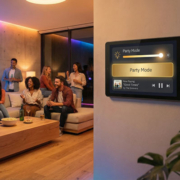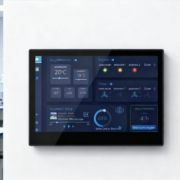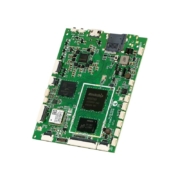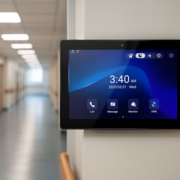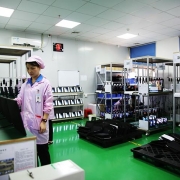HMI Smart Control Panels as the Nerve Center of Industry 4.0
As we move further into the digital age, the fusion of physical and digital systems continues to drive the evolution of industry. Central to this transformation is Industry 4.0, a new era characterized by smart factories, advanced robotics, and interconnected systems. At the heart of this industrial revolution, Human-Machine Interface (HMI) Smart Control Panels play a pivotal role in enabling seamless communication between operators and complex machinery. These panels are the nerve center that allows industries to harness the power of automation, real-time data, and intelligent decision-making.
The Role of HMI Smart Control Panels in Industry 4.0
Human-Machine Interface (HMI) systems have long been a staple in industrial control. However, as manufacturing moves into the Industry 4.0 era, traditional HMI systems are evolving to meet the demands of highly automated and data-driven environments. Today’s HMI smart control panels integrate cutting-edge technologies, including touch interfaces, AI-driven analytics, cloud connectivity, and IoT integration, offering far more than simple operational control.
These smart control panels serve as the nerve center of industrial operations, enabling operators to monitor, control, and optimize machinery and processes in real time. Whether it’s controlling an assembly line, adjusting environmental conditions, or tracking the health of critical assets, HMI smart control panels are the interface that allows operators to interact with the industrial ecosystem.
Key Features of HMI Smart Control Panels
- Intuitive Touchscreen Interfaces
One of the standout features of modern HMI smart control panels is their intuitive, high-resolution touchscreens. These screens provide an easy-to-use interface for operators to interact with machines, adjust settings, and receive alerts. The touch-based interface, combined with clear visual indicators, enhances user experience and reduces training time. - Real-Time Data Monitoring and Analytics
In Industry 4.0, real-time data is king. HMI smart control panels enable operators to access critical data about system performance, machine health, and production efficiency. With this information at their fingertips, operators can make informed decisions and address issues before they become critical. Additionally, integrated analytics allow for predictive maintenance, reducing downtime and improving overall equipment efficiency (OEE). - IoT Integration and Connectivity
The power of Industry 4.0 lies in the ability to connect everything. HMI smart control panels are designed to seamlessly integrate with Internet of Things (IoT) devices, sensors, and systems across the factory floor. This connectivity ensures that all parts of the production system are working in harmony, with up-to-date information flowing in real time. - Edge Computing Capabilities
Edge computing has become an essential aspect of Industry 4.0, allowing data to be processed at the source rather than relying on cloud-based servers. HMI smart control panels with edge computing capabilities process data locally, reducing latency and ensuring faster response times for critical operations. This is especially important for applications that require immediate action, such as controlling robotic arms or adjusting machine parameters on the fly. - Enhanced Security
In a world where cyber threats are a growing concern, security is paramount. Modern HMI smart control panels come with advanced security features, including encryption, multi-factor authentication, and secure communication protocols. This ensures that the data being transmitted and accessed is protected from unauthorized users, safeguarding the integrity of the entire industrial system. - Customizable OEM/ODM Solutions
Every industry has its own unique needs, and a one-size-fits-all approach simply won’t do. With OEM/ODM solutions, manufacturers of HMI smart control panels can tailor the hardware and software to meet the specific requirements of different industrial applications. Whether it’s customizing the touch interface, adding proprietary features, or integrating with existing systems, these customizable solutions ensure that each panel is designed to maximize efficiency and optimize operations for the end user.
Applications of HMI Smart Control Panels in Industry 4.0
- Manufacturing and Automation
HMI smart control panels are widely used in manufacturing environments to control machines, monitor production lines, and optimize workflows. These systems help streamline operations by offering centralized control and data access. - Energy and Utilities
In energy management, these smart panels allow operators to monitor and control the production, distribution, and consumption of energy. Whether it’s a power plant or a smart grid, HMI panels provide real-time insights into energy systems, enabling better decision-making for efficiency and sustainability. - Smart Buildings and Infrastructure
Smart control panels in buildings integrate various systems such as HVAC, lighting, and security, allowing facility managers to monitor and control energy usage, comfort, and safety. These panels also help automate processes based on real-time data, contributing to energy efficiency and cost savings. - Logistics and Supply Chain
With IoT connectivity and real-time data, HMI smart control panels help track inventory, monitor transportation, and optimize warehouse management. This leads to more efficient logistics operations, reducing delays and improving the accuracy of supply chain processes.
Future Trends: HMI Panels and AI Integration
Looking ahead, the integration of artificial intelligence (AI) with HMI smart control panels is set to revolutionize industrial automation further. AI-driven systems can predict potential equipment failures, analyze complex data patterns, and offer suggestions for optimization. This allows for more autonomous operations, with HMI smart control panels acting as intelligent gateways for real-time decision-making.
Additionally, the trend toward augmented reality (AR) and virtual reality (VR) interfaces in HMI systems is gaining momentum. These technologies allow for enhanced visualization of data and machine performance, making it easier for operators to interact with complex systems and troubleshoot issues remotely.
In the world of Industry 4.0, HMI smart control panels are no longer just tools for basic machine control—they are the nerve center of modern industrial operations. By providing real-time data, advanced analytics, seamless connectivity, and an intuitive interface, these panels empower industries to operate more efficiently, reduce downtime, and stay ahead of the competition.

